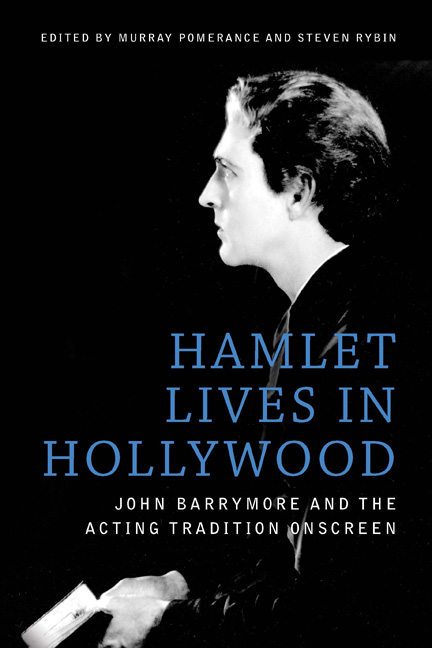Book contents
- Frontmatter
- Contents
- List of Figures
- The Contributors
- Acknowledgments
- Introduction
- 1 The Pre-Bard Stage Career of John Barrymore
- 2 Dangerously Modern: Shakespeare, Voice, and the “New Psychology” in John Barrymore's “Unstable” Characters
- 3 The Curious Case of Sherlock Holmes
- 4 John Barrymore's Introspective Performance in Beau Brummel
- 5 “Keep Back your Pity”: The Wounded Barrymore of The Sea Beast and Moby Dick
- 6 From Rome to Berlin: Barrymore as Romantic Lover
- 7 The Power of Stillness: John Barrymore's Performance in Svengali
- 8 Prospero Unbound: John Barrymore's Theatrical Transformations of Cinema Reality
- 9 A Star is Dead: Barrymore's Anti-Christian Metaperformance
- 10 Handling Time: The Passing of Tradition in A Bill of Divorcement
- 11 John Barrymore's Sparkling Topaze
- 12 “Planes, Motors, Schedules”: Night Flight and the Modernity of John Barrymore
- 13 Barrymore and the Scene of Acting: Gesture, Speech, and the Repression of Cinematic Performance
- 14 “I Never Thought I Should Sink So Low as to Become an Actor”: John Barrymore in Twentieth Century
- 15 Barrymore Does Barrymore: The Performing Self Triumphant in The Great Profile
- Works Cited
- Index
12 - “Planes, Motors, Schedules”: Night Flight and the Modernity of John Barrymore
Published online by Cambridge University Press: 23 June 2018
- Frontmatter
- Contents
- List of Figures
- The Contributors
- Acknowledgments
- Introduction
- 1 The Pre-Bard Stage Career of John Barrymore
- 2 Dangerously Modern: Shakespeare, Voice, and the “New Psychology” in John Barrymore's “Unstable” Characters
- 3 The Curious Case of Sherlock Holmes
- 4 John Barrymore's Introspective Performance in Beau Brummel
- 5 “Keep Back your Pity”: The Wounded Barrymore of The Sea Beast and Moby Dick
- 6 From Rome to Berlin: Barrymore as Romantic Lover
- 7 The Power of Stillness: John Barrymore's Performance in Svengali
- 8 Prospero Unbound: John Barrymore's Theatrical Transformations of Cinema Reality
- 9 A Star is Dead: Barrymore's Anti-Christian Metaperformance
- 10 Handling Time: The Passing of Tradition in A Bill of Divorcement
- 11 John Barrymore's Sparkling Topaze
- 12 “Planes, Motors, Schedules”: Night Flight and the Modernity of John Barrymore
- 13 Barrymore and the Scene of Acting: Gesture, Speech, and the Repression of Cinematic Performance
- 14 “I Never Thought I Should Sink So Low as to Become an Actor”: John Barrymore in Twentieth Century
- 15 Barrymore Does Barrymore: The Performing Self Triumphant in The Great Profile
- Works Cited
- Index
Summary
All you care about is planes, motors, schedules,” cries Simone Fabian in Night Flight (1933), reproving the managing director of the Trans-Andean European Air Mail for his lack of compassion towards his pilots. “When they land, when they take off,” she continues, waving at the map of South America behind him in his office, “just a map with a lot of lights on it!” Simone's husband Jules is one of those airmail pilots, en route from Punta Arenas, Chile to the airline's headquarters in Buenos Aires. After flying off course in a blinding rainstorm and with only minutes of fuel left, he and his wireless operator jump from the plane to their oceanic grave below. John Barrymore plays Rivière, the authoritarian director of the fictional airline, who has just informed Simone that her husband is lost. “We're doing everything that can be done,” he assures her sternly. “Unfortunately, we don't know just where to look. In the last message we picked up, he said he couldn't land. He was still over the sea, but he didn't know how far from shore.” When Simone reminds Rivière, desperately, that she is Jules's wife and loves him, Rivière replies, “Can't you see that's of no importance … when there's work to do?” Cold and mechanical, resistant to “tears and hysterics,” Rivière is Barrymore at his most ruthlessly antiromantic. Positioned opposite Simone, whose sentiment, he informs her, “is only in the way now,” Barrymore's Rivière represents the masculine gendering of an industrial and managerial modernity.
Barrymore, “The Great Profile,” was one of the preeminent actors of Hollywood cinema during the 1920s and early 1930s. There is much to be said of the techniques and traditions with which he created his roles, not only in films such as Dr. Jekyll and Mr. Hyde (1920), Don Juan (1926), Grand Hotel (1932), Dinner at Eight (1933), and Twentieth Century (1934) but also on stage—his Hamlet, which ran on Broadway from 1922 to 1923, was regarded as the greatest of his day (see Fowler and Morrison for earlier work that deals with some of this material). This chapter views a different face of Barrymore that, given his reputation as an actor, may come from a less likely perspective but it provides an opportunity for us to look closely at his film performances within a uniquely cinematic frame.
- Type
- Chapter
- Information
- Hamlet Lives in HollywoodJohn Barrymore and the Acting Tradition Onscreen, pp. 145 - 156Publisher: Edinburgh University PressPrint publication year: 2017



